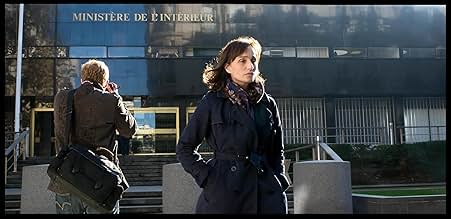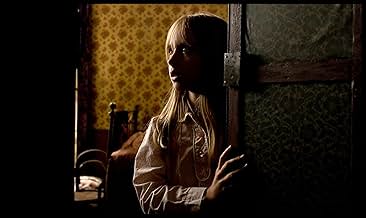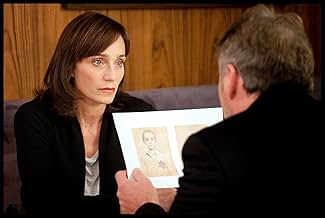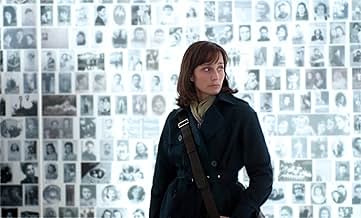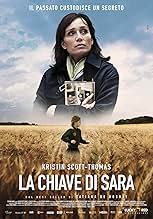Im heutigen Paris wird eine Journalistin mit einem jungen Mädchen verflochten, dessen Familie während der berüchtigten Vel'' d''Hiv-Razzia im Jahr 1942 auseinandergerissen wurde.Im heutigen Paris wird eine Journalistin mit einem jungen Mädchen verflochten, dessen Familie während der berüchtigten Vel'' d''Hiv-Razzia im Jahr 1942 auseinandergerissen wurde.Im heutigen Paris wird eine Journalistin mit einem jungen Mädchen verflochten, dessen Familie während der berüchtigten Vel'' d''Hiv-Razzia im Jahr 1942 auseinandergerissen wurde.
- Regie
- Drehbuch
- Hauptbesetzung
- Auszeichnungen
- 5 Gewinne & 5 Nominierungen insgesamt
- Joshua
- (as Joe Rezwin)
Empfohlene Bewertungen
The story begins in Paris in the summer of 1942 when the collaborationist Vichy government of France launches a round up of Jewish families. And here is the first cruel twist. It's not German troops breaking down doors, it is the Parisian police force, ever polite in its brutality. The second twist is more harrowing. Hearing the crashing on the front door, 10-year-old Sarah Starzynski (Mélusine Mayance) stuffs her younger brother into a secret closet (camouflaged as part of the bedroom wall) and locks the door.
Sarah and her parents are herded with thousands of other Jews into the Vélodrome d'Hiver, an indoor cycling arena, and left there without food, water or toilets. Here, Sarah's overarching struggle begins. She must rescue her brother.
From here on, Sarah's story is inter-cut with episodes from the present day when French-American investigative journalist Julia Jarmond (Kristin Scott Thomas) and her architect husband start to renovate the apartment once occupied by the Starzynski family. Learning of the sad history of the "Vél d'Hiv", Julia starts digging into the apartment's history and tracing the fates of Sarah and her family.
The first two thirds of the film focus on Sarah's struggle. Separated from her parents, she seeks to escape from an internment camp and get back to Pari. As we follow her, we also watch as Julia discovers that, while both the adult Starzynskis died during the war, there is no record of what happened to Sarah and her brother.
And here is the dramatic oddity of Sarah's Key. The culmination of Sarah's quest occurs at about the 75-minute mark of this 111-minute film. The half-hour coda is necessary to tie up loose ends such as the fate of Julia's troubled marriage and the joys and disappointments of her search for Sarah. But the tension that carries the first two acts is lost.
Despite that loss, Sarah's Key packs an emotional wallop that will stay with you after you leave the theatre.
So its weak reception in the United States (it grossed just over $100,000 on just five screens when it opened there) is dispiriting. Perhaps the U.S. fear of subtitles is to blame: a good two-thirds of the film is in French with English subtitles. In fact, I suspect that writer-director Gilles Paquet-Brenner could have made the entire film in French, and that making Julia bilingual was his attempt to lure an American audience.
"Sophie's Key" ought to be an exception. Of all the countries occupied by Nazi Germany, France has been the last to acknowledge its complicity in the slaughter of its Jewish citizens. This is a French film about the roundup of Parisian Jews by French police. If they survived the trip, they ended up in Auschwitz, a numerous sliver of the six million exterminated in the "Final Solution."
In the foreground, the story centers on Sophie, a 10-year-old (Melusine Mayance), and the effort of an American journalist (Kristen Scott Thomas) to discover what happened to the family that lived in the apartment she and her husband now occupy. Although well done, the story doesn't really matter. It is one more of the stories, fact or fiction, that have been told and may yet be told of every victim seized and slaughtered.
But mostly they are stories about the Nazis themselves. Here it is a story about French victims of the French government told by French film-makers. Scott Thomas, the English actress who has spent much of her life in France, is just about the only non-Frenchman in this film, and, as usual, she is a magnetic presence. Young Sophie (Mayance) is the film's other pillar. The older Sophie (Charlotte Poutrel) is given little to do except to be beautiful and act troubled but that's quite enough.
No need to spoil the story by telling any part of it. But the role of the Vichy government in the slaughter of French citizens is a part of history that needs to be remembered.
In modern day Paris, Julia and her family inspect an apartment of her in laws that her architect French husband will redo. Julia, am American, works as a journalist and wants to cover a story about the use of a velodrome where Parisian Jews where herded to and discovers the story of Sarah. An obsession grows as Julia is determined to find out what happened to the young girl and to find out how her husbands family came to own the flat.
This is a very fine film that is equally a historical story as well as a mystery as Julia seeks out the truth with a fine performance by Kristen Scott Thomas as Julia. The film flit's between the too separate yet connected story lines. Scenes of confusion within the velodrome are horrid too watch as are the scenes of separation of parents and children in the camp. We as the audience can almost guess the outcome of Sarah's young brother left locked in a closet whose key Sarah clings to, yet the outcome is still gut wrenching and Sarah's scream is enough for us to understand what she finds without us having to have it confirmed visually.
The obsession of Julia is a fascinating one; trying to work out first how the flat became someone elses, to searching for some sign of what became of the young girl takes her her far and wide and she encounters an array of people including Sarah's son, who is clueless to his Mother's past.
Scott Thomas gives quite a wonderful yet almost subdued performance as she struggles with the horrors of the past and her families connection to events as well as dealing with her own personal torment. The film is extraordinarily moving in it's telling of Sarah with her experience resonating and shaping those that come after her. Yet because the film chooses to focus on two timelines, we are never entirely dragged into the horrors of the Holocaust and whilst we are never far from them, it never overbalances itself. It is a fine film that depicted another story of the many thousands that WWII has given us, one that for France is of shame and one that, as with so many others continues to be relevant and effect those generations after.
More of my reviews at iheartfilms.weebly.com
Wusstest du schon
- WissenswertesThis was the most successful French movie in the Netherlands, due to the popularity of the book on which this movie was based, until Ziemlich beste Freunde (2011) took the record.
- Patzer(at around 1h 34 min) William finds the key to the closet in his mom's diary. But when Sarah opened the closet back in 1942, she left the key in the lock and was immediately taken away by her stepfather. So there is no way that she would still have the key.
- Zitate
Julia Jarmond: And so I write this for you, My Sarah. With the hope that one day, when you're old enough, this story that lives with me, will live with you as well. When a story is told, it is not forgotten. It becomes something else, a memory of who we were; the hope of what we can become.
- Alternative VersionenThe UK Blu-ray release has approx 9 minutes cut from the film compared to the French version.
- VerbindungenFeatured in De wereld draait door: Folge #6.38 (2010)
- SoundtracksLa Java Bleue
Music by Vincent Scotto
Lyrics by Georges Koger and Noël Renard
Licensed courtesy of EMI Records Ltd
All rights reserved
Top-Auswahl
Details
- Erscheinungsdatum
- Herkunftsland
- Sprachen
- Auch bekannt als
- La llave de Sarah
- Drehorte
- Rue Nélaton, Paris, Frankreich(Julia at the Vel d'Hiv historical location)
- Produktionsfirmen
- Weitere beteiligte Unternehmen bei IMDbPro anzeigen
Box Office
- Budget
- 10.000.000 € (geschätzt)
- Bruttoertrag in den USA und Kanada
- 7.693.187 $
- Eröffnungswochenende in den USA und in Kanada
- 115.708 $
- 24. Juli 2011
- Weltweiter Bruttoertrag
- 24.792.815 $
- Laufzeit1 Stunde 51 Minuten
- Farbe
- Sound-Mix
- Seitenverhältnis
- 2.35 : 1
Zu dieser Seite beitragen







